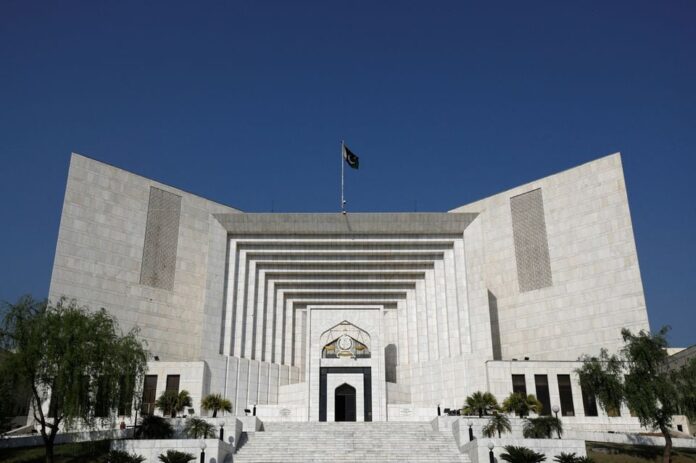—– Five-member bench unanimously declares that civilians would be tried under ordinary criminal laws
—– Four judges declare Section 2(1)(d) of Army Act unconstitutional
—– All 103 persons to be tried by criminal courts, rules SC bench
Staff Report
ISLAMABAD: The Supreme Court on Monday declared trials of civilians arrested following violent protests in the country on May 9 in military courts null and void.
The apex court announced its short verdict after reserving its decision following proceedings in the case earlier today on a set of petitions questioning the legitimacy of trying civilians in military courts.
The court, by a majority of 4 to 1, has held that the trial of civilians under Section 2 D (i) (ii) of the Army Act is unconstitutional. The five-member bench unanimously declared that civilians would be tried under ordinary criminal laws.
Justice Yahya Afridi reserved judgement on the validity of Section 2 D (i) (ii).
“Without prejudice to the generality of the foregoing the trials of civilians and accused persons, being around 103 persons who were identified in the list provided to the Court by the learned Attorney General for Pakistan by way of CMA No.5327 of 2023 in Constitution Petition No.24 of 2023 and all other persons who are now or may at any time be similarly placed in relation to the events arising from and out of 9th and 10th May, 2023 shall be tried by Criminal Courts of competent jurisdiction established under the ordinary and / or special law of the land in relation to such offences of which they may stand accused,” read the written order.
Civilians were arrested under the Army Act following incidents of rioting and vandalism following Pakistan Tehreek-e-Insaf (PTI) Chairman Imran Khan’s arrest on May 9. A five-member bench, led by Justice Ijazul Ahsan, heard the case. Justice Muneeb Akhtar, Justice Yahya Afridi, Justice Mazahir Naqvi, and Justice Ayesha Malik were part of the bench.
As the hearing commenced earlier today, Jawad S. Khawaja’s lawyer, Ahmed Hussain, expressed his intention to read the order from the previous hearing. However, the judge reminded him that during the last session, the attorney general had presented his arguments and suggested allowing him to conclude his case before proceeding with other matters.
Lawyer Salman Akram Raja also argued that the military courts have started the trial of civilians despite giving assurances in the court but Justice Ahsan directed him to listen to the attorney general first.
Attorney General of Pakistan (AGP) Mansoor Usman Awan provided a comprehensive summary of the previous hearing and explained why a constitutional amendment was not necessary for the present trial
He further added that he would draw insights from Article 175 and read out the Liaquat Hussain case. The AGP assured the bench that the accused in the May 9 case would be tried in military courts with the same procedural rigour as civil courts and argued that evidence would be recorded, and detailed reasoning would be provided in the verdict.
The court then inquired about the status of the accused. The attorney general clarified that among the accused were both citizens and members of other organizations. They would be tried under a dual legal framework, adhering to the Army Act and civilian court standards. The accused would be indicted, ensuring the due process requirements of a criminal case, he said. The AGP also asserted that Article 10A of the Constitution would be upheld. Appeals would be made to the high court and, subsequently, to the Supreme Court. Furthermore, even attacks on restricted areas and buildings could be subject to military court jurisdiction.
Justice Ayesha and Justice Mazahar then brought up the distinction between the Army Act’s emphasis on discipline within the armed forces and the law’s application to civilians. The attorney general argued that the law extended to those temporarily associated with the armed forces and even the ones who were debarred from duty.
Justice Ayesha continued about the Constitution’s commitment to protecting fundamental rights. She maintained that the law was meant to ensure that the fundamental rights of the Constitution would not be violated, rather than infringing on them. AGP Awan, however, continued to defend his perspective, referring to the connection of individuals with the armed forces.
Justice Ayesha further asked AGP Awan how he would connect his arguments with Article 8(3) of the Constitution. “According to the law, a link to the armed forces is necessary [for trial in military courts],” she maintained
Justice Ahsan also remarked that the country’s Constitution protected fundemental rights. .
On Sunday, the relatives of detainees approached SC, seeking to be party to the case. Their position was that the apex court was affected by the military courts’ proceedings and should, therefore, involve them in the case.
Simultaneously, the federal government informed the apex court that 102 individuals were arrested in connection with the May 9 and 10 incidents. They were assuring the court that trials in military courts would adhere to the ongoing SC case.
“Those found guilty would receive light sentences, while those who had served jail terms would be released,” it said. After the military trial, the convicts will be able to approach the relevant forum against the punishments as per law.
The persons taken into military custody were arrested under the Pakistan Army Act 1952 and the Official Secrets Act. The arrested persons are in custody for their involvement in the attack on Hamza Camp, Bannu Camp and Gujranwala Camp.




